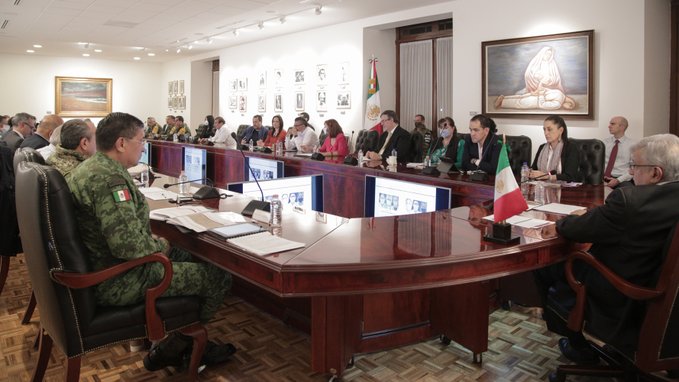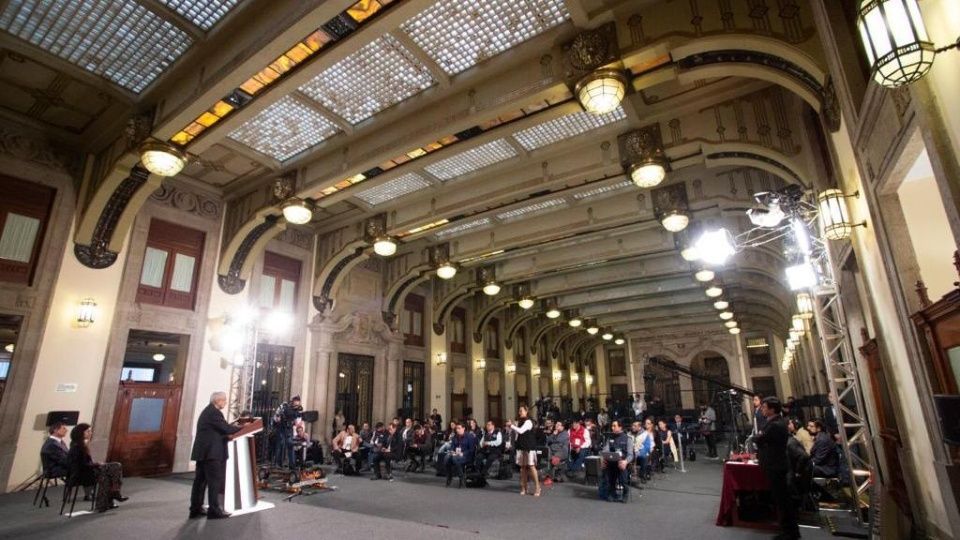This article is based on one written by Luis Vazquez, and has been translated and edited by LAB.
Like the populists in power in other countries, the president of Mexico has shown that his priorities are to hold on to power and minimize the gravity of the pandemic. This is revealed in his widely publicized denial of the seriousness of the illness in the early stages, and the concomitant mismanagement of communication and expectations. Although the president has moderated his denial posture, one of his closest associates, Ricardo Salinas Pliego, Mexico’s ‘second richest man’ and former employer of the Minister of Education, continues to call for an end to restrictions as does his Azteca TV network, second only to the Televisa empire. As in the US and Brazil, the state governors and city mayors have had to take initiatives on their own.
A health system already in turmoil
The crisis finds Mexico’s health system in the throes of major structural change, plus historic underfunding aggravated by the President’s own austerity policies and capital spending priorities.
The system is composed of two institutions: the Instituto Mexicano de Seguro Social (IMSS) which is responsible for those employed in the formal sector, and the Instituto de Seguridad y Servicios Sociales de los Trabajadores del Estado (ISSSTE), responsible for government employees. Under the Mexican constitution, State governments are responsible for the management and provision of health care, while funding comes largely from the federal government.
The president – known usually by his initials AMLO – instituted a major restructuring of the social security system at the start of his tenure. He abolished the ‘Seguro Popular’, a health scheme for low-income and informally employed people which charged a minimum of $80 a year, depending on income, and enrolled over 50 million people in 2017, giving them access to public and private medical facilities.
Denouncing it as ‘neoliberal’, AMLO replaced Seguro Popular with a new Instituto de Salud para el Bienestar (INSABI) which levies no charge and so should therefore reach many more people. However, Seguro Popular covered the entire range of treatments, whereas the new system does not cover operations.
The change was heavily criticized at first but it is hard to tell whether those criticisms were politically motivated, since they came from opposition state governors, some of whom have simply refused to implement the INSABI. However the real problem is that just when the pandemic has hit the country the new system is still not fully operational. The resulting deficiencies in health funding have led to protests from medical staff and from patients, the most prominent of which have been monthly demonstrations against the shortage of medicines for child cancer sufferers.
Life decisions at the toss of a coin
Opposition-led states including Jalisco (capital Guadalajara, the country’s second city), took decisive measures ahead of the federal government, closing schools and businesses and calling on residents to stay at home.
A sign of the confusion which reigns in the federal government is the publication and then partial withdrawal of a highly sensitive briefing, ‘Bioethical Guidance on Allocation of Resources in Critical Medicine’, produced by the secretariat of Public Health Council (Consejo de Salubridad General). This document, which was not approved by the council itself, advised medical staff, in cases where all resources are exhausted, to prioritize young people over the elderly and those suffering from chronic diseases and then, shockingly, if resources were still insufficient, to use a random method – i.e. toss a coin…
prioritize young people over the elderly and those suffering from chronic diseases and then if resources are still insufficient, use a random method – i.e. toss a coin
In a spurious attempt to validate its guidance the document inserted a reference to a 2011 article in the Journal of Human Reproductive Sciences (2011) which turned out to have been subsequently retracted by the Journal’s Editor on grounds of plagiarism. The document is now unfindable. The rector of UNAM (Universidad Nacional Autónoma de México) who is a member of the Public Health Council, said he had heard nothing of the guidance.
In a highly significant development, UNAM itself withdrew medical trainee interns from hospitals where they were exposed to infection because of the shortage of protective equipment, a decision described as ‘appropriate’ by Hugo López-Gatell, Under-Secretary of Health Protection and Promotion at the Health ministry and leading COVID-19 official. Now, at the end of the month, they have received sufficient assurances to send the students back again.
Chaos is come
On 20 April the Financial Times and Mexican newspapers reported that the governor of the state of Baja California, himself a member of the president’s Morena party, said official figures seriously underestimated cases and deaths in his state where the situation in some hospitals in the border city of Tijuana ‘appeared critical’ – a video appeared apparently showing ‘body bags crammed into a storeroom’ and the governor spoke of doctors ‘dropping like flies’. Central American migrants are held there in crowded prison-like conditions, and others, who are sent back from the United States, are often in poor health, evidently creating a dangerously infectious environment.
Isolated incidents of violence against medical personnel have been reported in El Universal: the IMSS has in some cases called in military or security personnel to protect hospitals and as of 4 April 38 medical equipment storage units were under military protection. The military have been heavily involved in government projects throughout this administration, such as the Santa Lucía airport, and the president has now activated a plan known as DN-III drawn up by the Ministry of Defense in 1966 to prepare for natural disasters, and it is possible that the military will build ten new hospitals.

The daily early morning presidential press conferences – irreverently dubbed mañaneras – churn out official propaganda.
As in the US and Brazil scientific advisors are in a difficult position –to challenge the behaviour of personalist politicians too openly in the midst of this kind of health crisis, could have uncontrollable and even tragic consequences. López-Gatell, as chief epidemiologist, provides a daily afternoon update, and seems to have decided that it is better to pay deference to the president even at the price of making occasional concessions, in order to keep respectable epidemiology in official communication.
When the virus first reached the country and the president refused to give up his mass meetings and physical contact with his supporters, López Gatell said he was not a vector of the virus but rather a vector of morality. The difficult situation of technocrats, medical staff and researchers in the face of the government’s urge to flatten the curve and move on is further highlighted by the announcement that schools will reopen across the country on 1 June, which experts regard as too early and risky given that the country only entered Phase 3, the acutest phase of the epidemic, on 21 April.
Readers will not have failed to notice that in Mexico, like Brazil and the US, but unlke Chile, Argentina or Colombia for example, the response of governments has been intertwined with ideological and personalistic politics, and with the shifting relations between federal, state and local governments. This will give food for thought for many years to come as the size of the harm becomes clearer.

